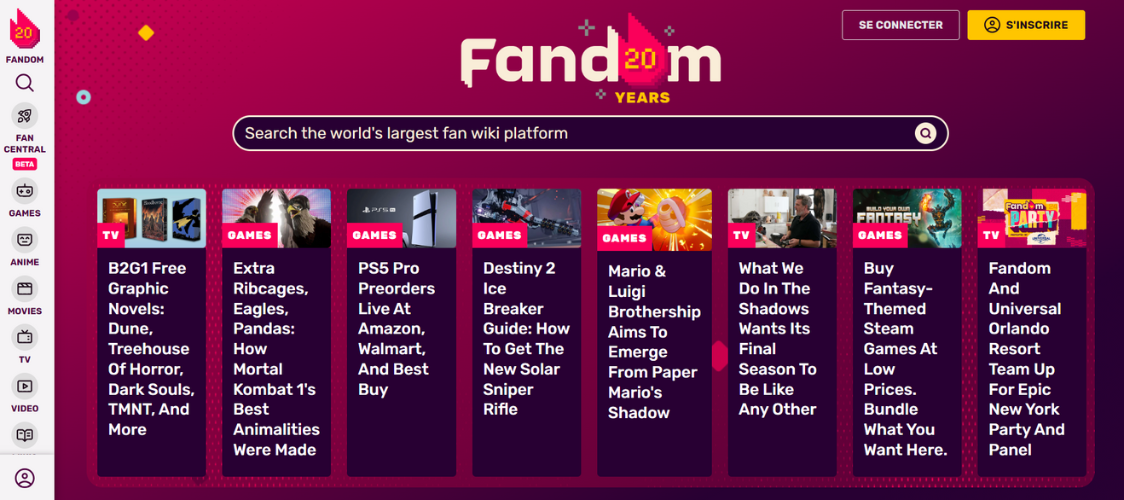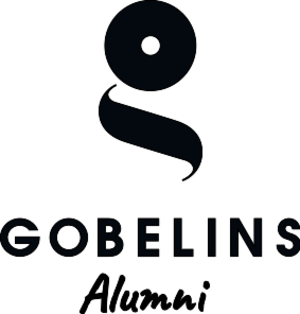News

Florent Blachot, VP of Data Science and Engineering at Fandom
A graduate of the Mastère Spécialisé Interactive Digital Expériences in 2012, Florent Blachot worked at Ubisoft for 8 years, first as "Senior Manager Data Science" then as "Director of Data Science" before joining Fandom. Now VP of Data Science and Engineering, he takes us back over his career and tells us more about data science and its application.
You graduated from the Mastère Spécialisé Interactive Digital Expériences in 2012. What has been your career path since then?
I joined Ubisoft at the end of my internship at the Strategic Innovation Lab, Ubisoft's think tank. I was working on long-term projects such as "How does Ubisoft see data in 5 or 10 years' time? I also studied the " consumer decision journey ", i.e. the evolution of players' behavior and decisions as they develop their relationship with a brand or a game.
I stayed with the team for 3 years, then met the VP of Marketing of the San Francisco team at a company dinner. Six months later, I had my visa and contract, and I was off to settle down there with my wife and kids. I've been living in the Bay Area for over 8 years now.
At first, I was alone with his best data analyst. Then the team grew and we gained the confidence of the CEO and President. Our mission was to work on player acquisition and engagement : how to attract players, how to create bridges between games...
I was then contacted by a headhunter for a position as VP of data at Fandom. Fandom is a Wikipedia spin-off, co-created by founder Jimmy Wales in 2004. The site brings together all Wikipedia content of interest only to fan communities. Star Wars lightsabers and starships, for example, each have their own dedicated page on Fandom.
What is data science?
Data science enables us to understand user behavior and improve their experience. It involves cross-referencing different streams of data to draw conclusions.
For example, Assassin's Creed is an open-world game in which players embody an assassin, which means they have to be discreet and stealthy in the game to avoid detection. However, we found that 42% of players played in a rather brutal manner, the opposite of what is expected in the experience. Satisfaction surveys also revealed that almost all users were interested in the historical and cultural aspects of the game.
These analyses enabled us to understand player behavior and motivations. We were able to conclude that players who behave in a rather violent way aren't really interested in the game's mechanics, but rather in moving forward in the story to find out what happens next.
We were able to share these results with the marketing teams and suggest that they focus their promotion on the game's history and intrigue. We also suggested to the game design teams that the game should evolve towards a more RPG (role-playing game) version, better suited to different types of player.

Fandom home page
You're currently VP of Data Science & Engineering at Fandom. What does your job involve?
Fandom, like Wikipedia, made little use of data before I arrived four years ago. This data is used to understand the content and see how it can be improved, but also how transitions between content can be achieved.
Fandom works by community. Each community will have its own wiki experience. Navigating and understanding content is therefore crucial. I've been working on understanding the behavior of Fandom users to see how we can improve the user experience.
My work also involves a much more technical side. I'm in charge of setting up the pipelines and theuse of artificial intelligence and large language models (LLMs) on the site, data that enables machines and generative AI to interpret the subtleties of language.
Fandom hosts nearly 100 million wiki articles. Some of these articles are so detailed that it takes several hours to read them. So there's a lot of work to be done with the AI to associate the topics corresponding to the articles with the games, films, series, etc. that are mentioned, so as to be able to make cross-references to other content.
This work also makes it possible to target the age ranges of the articles and ensure that Fandom doesn't send users to pages or ads that don't correspond to their age range.
As VP, I also manage a team of around twenty people. My teams are very decentralized. They're scattered across the San Francisco Bay Area, Los Angeles and Poland.
Why did you want to move to San Francisco?
I wanted to go and live abroad to improve my English. It was really lacking for me and I wanted my children to be able to learn a second language in a native way.
I was in discussions with Ubisoft for various positions, the main one being in San Francisco. I was also in discussions with Ubisoft for Singapore and Montreal. I also received offers from other companies. The day I received confirmation from Ubisoft to move to San Francisco, I had an interview with Lego in Denmark!
Which project has impressed you the most?
I ran a GenAI unit for Fandom, to understand how fan communities work and see how we could help and collaborate with them.
We used GenAI to create the " Quick Answer " feature, a tool for redirecting users on different pages. This feature rearranges information on wiki pages into frequently asked questions that appear as modules on the page on which they are based. These modules are directly linked to the topic of the page and answer questions about it.
We've analyzed Google queries to identify keywords that can link to a fan community. For example, from a search like "What's Goku's real name in Dragonball Z?", we used OpenAI's APIs to generate questions on the same theme (who are Goku's parents, who is Goku...). Then we used systems related to the broad language model to find the articles in Fandom that best answered these questions.
We then consulted Fandom's editors and contributors before publishing this FAQ, to ensure their consent and so that they could make the necessary changes to ensure the FAQ's accuracy.
We have also optimized the FAQ format to ensure that it is well referenced by Google and that users can find the content they are looking for as directly as possible.
Why did you choose IDE training?
I already had a PhD in Computer Science before taking the course. I had been working for 8 years on algorithmic optimization and felt that I was missing some knowledge of user experience.
I decided to take a career break and go into the world of video games, which I've always found fascinating. I wanted to refocus my career on something more creative and closer to the user.
I also wanted to work in smaller companies - I had no intention of working for Ubisoft at that point!
The short duration of the course was also an advantage, as I couldn't see myself returning to a Master's degree or a Bachelor's degree followed by a Master's degree!
Can you tell us one good memory from your year at GOBELINS?
The people I trained with! I'm still in touch with two of them on a regular basis. The bonds we created during the projects and courses were very strong.
What advice would you give to young graduates?
In my opinion, the school offers two advantages: access to quality teaching andintegration into a strong network.
A lot of people have been there before you, and many of them have gone on to have very important careers. A school is an experience, a place where you learn things, but it's also a long-term network. Don't hesitate to use and build on this network as the years go by.













No comment
Log in to post comment. Log in.